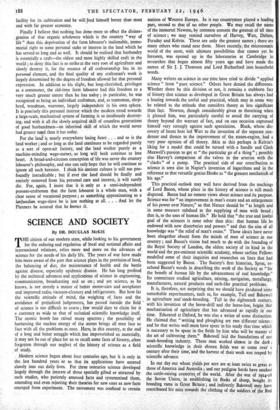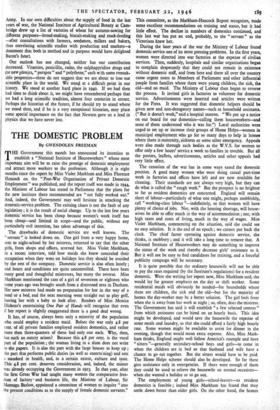SCIENCE AND SOCIETY
By DR. DOUGLAS McKIE THE citizen of our modern state, while looking to his government for the ordering and regulation of local and national affairs and international relations, relies more and more on the advances of science for the needs of his daily life. The years of war have made him more aware of the part that science plays in the provision of food, the balancing of diet, the maintenance of health and the battle against disease, especially epidemic disease. He has long profited by the technical advances and applications of science in engineering, communication, broadcasting and so on ; and yet science, as he knows, is not merely a matter of better motor-cars and aeroplanes and improved radio, vacuum-cleaners and refrigerators. But how far the scientific attitude of mind, the weighing of facts and the avoidance of prejudiced judgements, has passed outside the field of science is too difficult to assess ; few would dare to claim for it a currency as wide as that of technical scientific knowledge itself. The atomic bomb has raised many spectres ; the possibility of harnessing the nuclear energy of the atoms brings all men face to face with all the problems at once. Here, in this country, at the end of a long and bitter struggle which has impoverished us materially, it -may not be out of place for us to recall. some facts of history, often forgotten through our neglect of the history of science as a field of study.
Modern science began about four centuries ago, but it is only in the last hundred years or so that its applications have entered closely into our daily lives. For three centuries science developed largely through the interest of those specially gifted or attracted by such studies, who patiently amassed facts and systematised them, amending and even rejecting their theories for new ones as new facts emerged from experiment. The movement was confined to certain
nations of Western Europe. In it our countrymen played a leading part, second to that of no other people. We may recall the name of the immortal Newton, by common consent the greatest of all men of science ; we may remind ourselves of, Harvey, Watt, Dalton, Faraday and Kelvin. These are only the greatest names ; there are many others who stand near them. More recently; the microcosmic world of the atom, with ultimate possibilities that cannot yet be foreseen, was opened up in the laboratories at Cambridge in researches that began almost fifty years ago and have made the names of Sir J. J. Thomson and Lord Rutherford into household words.
Many writers on science in our time have tried to divide " applied science " from " pure science." Others have denied the difference. Whether there be this division or not, it remains a stubborn fact of history that science as developed in Great Britain has always had a leaning towards the useful and practical, which may in some way be related to the attitude that considers theory as less significant than fact. Newton, though considerably given to theorising when it pleased him, was particularly careful to avoid the carrying of theory beyond the warrant of fact, and on one occasion expressed himself very strongly against such speculation. Black, whose dis- covery of latent heat led Watt to the invention of the separate con- denser and thence to the improvement of the steam-engine, had a very poor opinion of all theory. Akin to this perhaps is Kelvin's liking for a model that could be turned with a handle and Clerk Maxwell's passion to get at " the particular go of a thing " ; possibly also Harvey's comparison of 'the valves in the arteries with the " clacks " of a pump. The practical side of our contribution to science is seen also in Napier's invention of logarithms and in the reference to that versatile genius Hooke as "the greatest mechanick of his age."
This practical outlook may well have derived from the teachings of Lord Bacon, whose place in the history of science is still much disputed. Bacon had no remote views about science and its purpose. Science was for " an improvement in man's estate and an enlargement of his power over Nature," so that Nature should be " at length and in some measure subdued to the supplying of man with bread ; that is, to the uses of human life." He held that " the true and lawful goal of the sciences is none other than this: that human life be endowed with new discoveries and powers " and that the aim of all knowledge was " the relief of man's estate." These ideals have never been altogether absent from the minds of men of science in our country ; and Bacon's vision had much to do with the founding of the Royal Society of London, the oldest society of its kind in the world and the pre-eminent scientific academy, whose earliest Fellows modelled some of their inquiries and researches on lines that had been suggested by Bacon. The Society's first historian, Sprat, re- echoed Bacon's words in describing the work of the Society as "for the benefit of human life by the advancement of real knowledge." Its committees studied agriculture,' mining,, navigation, metallurgy, manufactures, natural products and such-like practical problems. It is, therefore, not surprising that we should have ProduCed some remarkable experimenters, such as, for example, Tull and Bakewell in agriculture and stock-breeding. Tull in the eighteenth century, with his invention of the horse-drill and the horse-hoe, began that mechanisation of agriculture that has advanced so rapidly in our time. Educated at Oxford, he was also a writer .of some distinction. He claimed that " writing and ploughing are two different talents ; and he that writes well must have spent in his study that time which is necessary to be spent in the fields by him who will be master of the art of cultivating them." Bakewell laid the foundations of our stock-breeding industry. These men worked almost in the dark ; scientific knowledge in their chosen fields was to come over- a century after their time, and the harvest of their work was reaped by scientific advance.
In our day our wheat yields per acre are at least twice as, great as those of America and Australia ; and our pedigree herds have stocked the cattle-raising countries, of the world. After the war of 1914-18 the Soviet Union,- in establishing its flocks of sheep, botight its breeding rams in Great Britairr; and indirectly Bakewell may have contributed his mite towards the clothing of the soldiers of the Red
Army. In our own difficulties about the supply of food in the last years of war, the National Institute of Agricultural Botany at Cam- bridge drew up a list of varieties of wheat for autumn-sowing for different purposes—bread-making, biscuit-making and stock-feeding —after consultations with farmers, seedsmen, millers and bakers, thus correlating scientific studies with production and markets—a document that both in method and in purpose would have delighted Bacon's heart.
Our outlook has not changed, neither has our contribution decreased. Vitamins, penicillin, radar, the sulphapyridine drugs and the new plastics, " perspex " and " polythene," each with some remark- able properties—these do not suggest that we are about to lose our scientific place in the world. We stanci, at a difficult point in our history. We stood at another hard place in 1940. If we had then had time to think about it, we might have remembered perhaps that we had a long scientific tradition, almost four centuries in extent. Perhaps the historian of the future, if he should try to stand where we stood then, and if he is a very exceptional historian, may place some special importance on the fact that Newton gave us a lead in physics that we have never lost.































 Previous page
Previous page